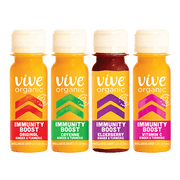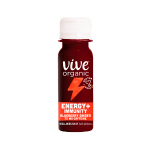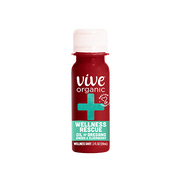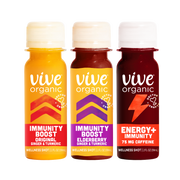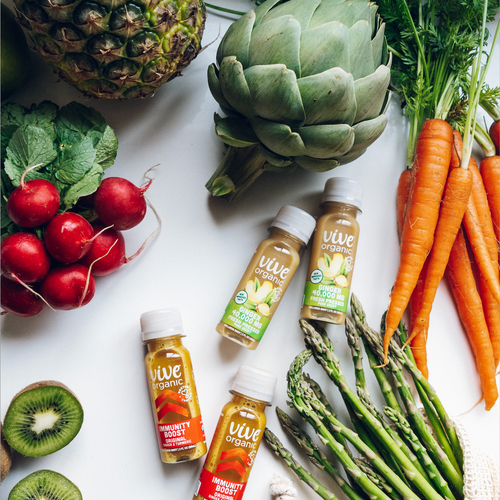How to Boost Your Metabolism Naturally
Learn 8 science-backed ways to boost your metabolism
How do you boost your metabolism and why is it important? Focusing on your metabolism and how to boost it may help you find small wins in the self-care department. Along with burning calories and helping you maintain a healthy weight, your metabolism powers your entire body. Every organ and system in your body relies on your metabolism for energy.1
Metabolism plays a key role in our body’s well-being and is intertwined with a vital aspect of our health – our immune system.
What is Metabolism?
Metabolism is the chemical reaction in the body’s cells that converts food into energy. The body uses this energy to keep you breathing, thinking, moving, and living.1
Your metabolism has an integral role in every aspect of your whole-body health:1, 2
- Digestion and gut microbiome health
- Lung function and breathing
- Blood circulation
- Immune system support and health
- Growing new cells and repairing cell damage
- Hormone regulation
- Body temperature
- Weight loss, gain, and maintenance
- Building and keeping muscle
Metabolism is governed by two processes: anabolism and catabolism. The body works hard to keep these in sync and functioning.3, 4
1. Anabolism: this constructive metabolic process is focused on building, storing, and growing. Anabolism is the engine that enables cell growth, body tissue maintenance, energy storage, muscle building, and more. This is the process that changes small molecules, cells, nutrients, or amino acids into carbohydrates, fat, and protein.
Anabolism is picky, requiring high quality food sources to help your body grow, recover, heal, and thrive.
2. Catabolism: This destructive metabolic process breaks down molecules, creating the energy the body requires to function. Catabolism happens as you digest food, pulling energy from carbohydrates, protein, and fat. However, if the body needs energy and there aren’t any food sources, catabolism looks for stored fat, muscle, and other body tissues to break down and convert to energy.
Catabolism is not picky about its sources, it will use whatever you give it. Any extra energy is stored as fat, providing catabolism with a constant fuel source.
How to Boost Your Metabolism: 8 Science-Backed Habits
To boost your metabolism incorporate these 8 science-backed habits for the long-term:5, 6, 7, 8, 9
-
Drink More Water
Drinking cool or lukewarm water stimulates a thermogenic effect in your body, forcing your body to use energy to warm up your core temperature, providing a short-term boost to your metabolism.Hydration and staying hydrated is key to helping your metabolism and core bodily functions running effectively. Even slight dehydration can slow down your metabolism.
-
Focus On Protein
Protein is a powerhouse macronutrient, and you are likely not eating enough of it. Protein helps boost your metabolism in three key ways: muscle growth and maintenance, thermogenesis, and hormone regulation.Protein is essential for muscle growth and maintenance. Muscle burns more calories at rest than fat, helping to boost your metabolism. And the more muscle you have, the stronger you are, giving you the strength and support you need to enjoy a full and active life.
Your metabolism uses more heat energy or calories (thermogenesis) to digest, process, and absorb protein than carbohydrates and fat. This thermogenic effect gives your metabolism a temporary boost.
A higher protein intake also stimulates your satiety hormones (GLP-1, peptide YY, and cholecystokinin) and reduces levels of the hunger hormone, ghrelin. Protein is also essential for estrogen and testosterone production, two hormones involved in anabolism.
-
Remember Diet Quality
A diet rich in fruits, vegetables, lean proteins, and healthy fats is the foundation of general health and well-being. These foods are high in essential vitamins, minerals, amino acids, proteins, carbohydrates, fats, and other nutrients the body and your metabolism need.Food is your fuel, and the higher the quality of your food, the better your fuel, and the stronger your engine.
And remember, anabolism, one of the metabolic processes, is picky and demands high-quality food sources to enable growth, recovery, and healing.
-
Lift Weights
The more muscle you have, the higher your basal metabolic rate (BMR). Your BMR determines how many calories your body needs to function at rest. When you lose weight quickly or deeply restrict your calories, your BMR drops.Lifting weights or doing resistance band or bodyweight exercises consistently, helps you build more muscle, helping to boost your BMR and metabolism. Strength workouts also help you retain muscle, helping to slow age-related muscle loss. Remember, to build more muscle, you need more protein and adequate calories.
-
Go To Sleep
Numerous studies tell us that people low on sleep are more likely to be overweight, struggle to lose weight, be hungry more often, and metabolize fat differently.The quality of your sleep influences your whole-body health from hormone regulation, insulin sensitivity, body composition, immune system health, stress management, and more.
-
Do High Intensity Training
High intensity training or HIIT is all the rage these days, and for good reason. HIIT helps you burn more fat, boost your metabolism, build muscle, and improve your overall fitness.HIIT involves short and intense intervals of aerobic activity. Think of adding short 30 second sprints to your daily jog or bike ride.
-
Be Patient
It takes time for your body to adjust to new habits. Be patient with yourself. Building muscle takes time. Long-term healthy habits take time to develop.Rushing in with drastic dietary and exercise changes can actually damage your metabolism – impacting your BMR and slow your metabolism. Your body responds to by holding onto fat and calories and using your muscles and body tissue for energy and fuel.
-
Manage Stress
When you’re stressed, your body releases the stress hormone cortisol. Cortisol tells your body to get ready for a perceived threat, putting you in fight-for-flight mode. In this mode, energy and blood flow are diverted from digestion and metabolism, causing a slowdown.Try to practice stress-reduction techniques like meditation, yoga, daily exercise, or deep breathing exercises.
Extra Bonus Metabolism Boosters – drink green or oolong tea, spice up your meals, stand up more, and avoid crash diets.9
Remember, everyone is unique. Your genetics, age, and overall health status have a large influence on your metabolism. Your friend may have an easier time boosting their metabolism than you – this is okay. Be patient with yourself. Do not compare yourself to others. Focus on the long-term and building healthy habits proven to support a healthy metabolism.
Disclaimer: This blog contains promotional content about our products. The information provided in this blog is for educational and informational purposes only and should not be construed as medical advice. While the nutritional information and health tips shared here are based on published studies and expert insights, they should not replace advice and treatment from a healthcare professional. Always consult a qualified healthcare provider with any questions you may have regarding a medical condition or health objectives.
Resources
- Chi, H. Immunometabolism at the intersection of metabolic signaling, cell fate, and systems immunology. Cell Mol Immunol 19, 299–302 (2022). (Accessed January 10, 2024) https://doi.org/10.1038/s41423-022-00840-x
- Louise E Olofsson, Fredrik Bäckhed, The Metabolic Role and Therapeutic Potential of the Microbiome, Endocrine Reviews, Volume 43, Issue 5, October 2022, Pages 907–926. (Accessed January 10, 2024) https://doi.org/10.1210/endrev/bnac004
- Catabolism vs. Anabolism: What’s the Difference?: Healthline.com (Accessed January 10, 2024) https://www.healthline.com/health/catabolism-vs-anabolism
- Anabolism vs. Catabolism: The Role They Play in Your Metabolism: Cleveland Clinic (Accessed January 10, 2024) https://health.clevelandclinic.org/anabolism-vs-catabolism
- The Truth About Metabolism: Harvard Health Publishing (Accessed January 10, 2024) https://www.health.harvard.edu/staying-healthy/the-truth-about-metabolism
- 8 Ways That May Speed Up Your Metabolism: Healthline.com (Accessed January 10, 2024) https://www.healthline.com/nutrition/10-ways-to-boost-metabolism
- How to Boost Metabolism: 12 Natural Ways: Verywell Health (Accessed January 10, 2024) https://www.verywellhealth.com/how-to-boost-metabolism-7501652
- How Protein Can Help You Lose Weight Naturally: Healthline.com (Accessed January 11, 2024) https://www.healthline.com/nutrition/how-protein-can-help-you-lose-weight
- Sharma S, Kavuru M. Sleep and metabolism: an overview. Int J Endocrinol. 2010;2010:270832. doi: 10.1155/2010/270832. Epub 2010 Aug 2. PMID: 20811596; PMCID: PMC2929498. (Accessed January 11, 2024) https://www.ncbi.nlm.nih.gov/pmc/articles/PMC2929498/
